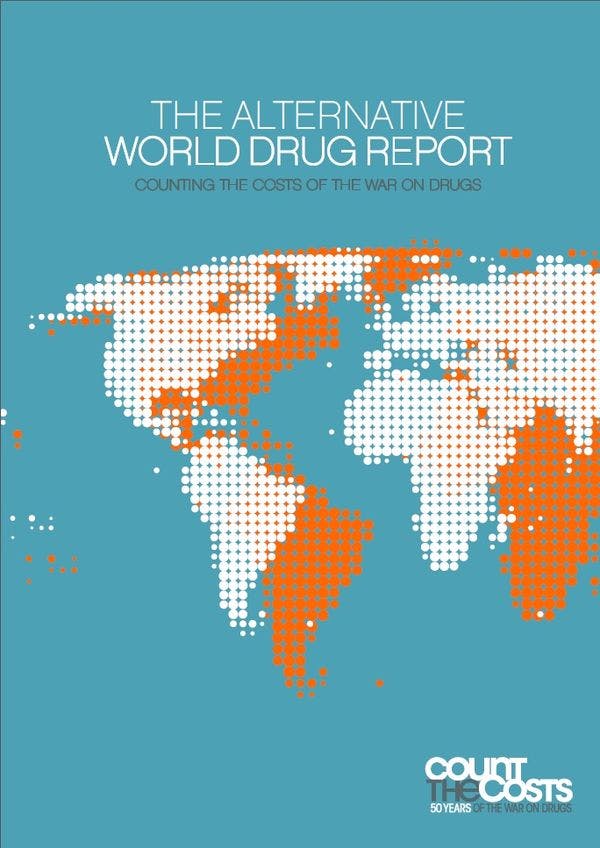Calcula los costos: Informe mundial alternativo sobre drogas
El Informe Mundial Alternativo sobre Drogas, realizado por la organización Calcula los Costos, completa las evaluaciones de los gobiernos y de las Naciones Unidas, detallando el rango total de impactos negativos de la “guerra contra las drogas” y planteando las opciones disponibles para la exploración de enfoques alternativos que pudieran rendir mejores resultados.
Lea el informe ejecutivo, aquí.
Más información, en inglés, disponible abajo.
Suscríbase a las Alertas mensuales del IDPC para recibir información sobre cuestiones relacionadas con políticas sobre drogas.
A new report, launched to coincide with publication of the 2012 UN Office on Drugs and Crime’s World Drug Report, exposes the failure of governments and the UN to assess the extraordinary costs of pursuing a global war on drugs, and calls for UN member states to meaningfully count these costs, and explore all the alternatives.
After 50 years of the current enforcement-led international drug control system, the “war on drugs” is coming under unparalleled scrutiny. Its goal was to create a ‘drug free world’. Instead, despite more than a trillion dollars spent fighting the war, according to the UNODC illegal drugs are used by an estimated 270 million people and organised crime profits from a trade with an estimated turnover of over $330 billion a year - the world’s largest illegal commodity market.
In its 2008 World Drug Report the UNODC acknowledged that choosing an enforcement based approach was having a range of negative ‘unintended consequences’ including: the creation of a vast criminal market, displacement of the illegal drugs trade to new areas, diversion of funding from health, and the stigmatisation of users.
It is unacceptable that neither the UN or its member governments have meaningfully assessed these unintended consequences to establish whether they outweigh the intended consequences of the current global drug control system, and that they are not documented in the UNODC’s flagship annual World Drug Report.
This groundbreaking Alternative World Drug Report fills this gap in government and UN evaluations by detailing the full range of negative impacts resulting from choosing an enforcement-led approach:
- Wasting billions and undermining economies
- Harming international development and security, and fuelling conflict
- Threatening public health, spreading disease and causing death
- Undermining human rights
- Promoting stigma and discrimination
- Creating crime and enriching criminals
- Causing deforestation and pollution
The report also describes the other options for controlling drugs, including health led approaches and legal state regulation and control. It ends with a call on UN member states to count the costs of the war on drugs, and properly explore all alternatives that might deliver better outcomes.
Count the Costs spokesperson Martin Powell said:
“This powerful report exposes the skewed and incomplete nature of UNODC’s annual World Drug Report by telling the other half of the story, laying out the unsustainable costs of pursuing an enforcement-led approach to the drug problem.
The 'war on drugs' is a policy choice. There are other options that, at the very least, should be debated and explored using the best possible evidence. For the sake of their citizens, UN member states have a duty to make sure that now happens.”
Carel Edwards, Former Head of the European Commission's Anti-Drug Coordinating Unit said:
“This important report comes at a crucial time in the campaign for drug policy reform, with countries in Latin America no longer willing to blindly support a war on drugs that has cost them so dearly. The evidence brought together in this report is a serious indictment of the current regime, and supporters of this initiative are right to call upon heads of UN member states to count the costs of the war on drugs, even if that reveals failure, and to explore alternative options. Only then will we have the evidence to make informed judgements about how best to deal with one of the most pressing concerns of our time.”
Keep up-to-date with drug policy developments by subscribing to the IDPC Monthly Alert.
Temas
Regiones
Perfiles relacionados
- Count the Costs
